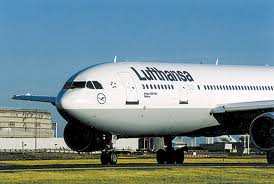
The agreement represents a major step forward for both companies, as this is the first time that renewable fuel is announced to be used on normal scheduled flights.
Flights will begin after official approval has been received from the ASTM (American Society for Testing and Materials) allowing the use of jet fuel produced using Neste Oil’s NExBTL technology. This is expected to take place in spring 2011.
Lufthansa’s flight program is part of a development project supported by the German Ministry of Economics and Technology that in addition to Lufthansa involves companies such as MTU and Deutsche Airbus as well as a number of universities. During the initial phase, flights will take place between Frankfurt and Hamburg (Germany). The aircraft on the route will use a blend of 50% NExBTL jet fuel and 50% fossil-based jet fuel in one engine, while the other engine will use conventional jet fuel.
“Lufthansa and Neste Oil are leading the field in moving towards greener aviation, and we’re very pleased to be able to announce that we will now be working together,” says Lufthansa’s Joachim Buse, Vice President Aviation Biofuel. “In addition to a smaller carbon footprint, renewable jet fuel will also reduce emissions of pollutants such as SOx.”
“We’re very proud of the fact that our NExBTL technology is capable of meeting aviation needs,” says Matti Lievonen, Neste Oil’s President and CEO. “Aviation fuels are covered by very strict quality standards, and our NExBTL technology has proved that it can produce a fuel meeting these standards. Being a pioneer in this area is very positive for us, as it could open up major business opportunities in the future.”
Fuel quality is a critical issue in the aviation industry. Aviation fuel needs to have a high energy content and be capable of dealing with the very cold temperatures found at the altitudes aircraft travel. As a pure hydrocarbon with a chemical composition identical to that of conventional jet fuel, Neste Oil’s NExBTL renewable jet fuel meets all these requirements.
Under a target agreed by the member airlines of the International Air Transport Association (IATA), future growth of aviation will be carbon-free from 2020, which will require the large-scale adoption of renewable fuels. Flights to and from EU destinations will be included in the EU’s Emissions Trading Scheme from 2012 onwards. Airlines will then be required either to offset their emissions using emission certificates or use renewable fuels. In contrast to road traffic, aviation will not be covered by a biofuel mandate, however.



